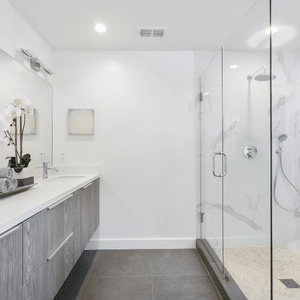Is Granite Porous? And 7 Answers to Your Other Top Granite Questions

While granite countertops are a popular option for kitchens, bathrooms, laundry rooms, and more, you need to know what to expect before making this long-term investment in your home.
The first thing many people usually want to know is whether or not granite is porous due to durability concerns, but you also likely have plenty of other questions related to this highly popular stone — and you surely want to know how it measures up to competitors like marble and quartz!
Here’s what you need to know before you choose your granite slab.
Is Granite Porous?
Like all natural stone, granite is a porous material, which means it has minuscule pockets of empty space throughout its structure.
However, you’re not placing raw, unfinished stone on top of your cabinets – you’re selecting a slab that once finished and sealed, will have significantly reduced porosity.
The finishing process can proceed in a variety of ways. Polishing the stone to a high shine minimizes the porous nature of the surface best, but even honed or leathered finished surfaces (which are less polished) enjoy some reduction of porosity.
Sealing the stone essentially finishes the job, creating a surface that is, for all intents and purposes, nearly non-porous.
With that being said, you will need to properly care for granite countertops to maintain the seal, avoiding products that could wear it away, as well as resealing regularly. This will help to prevent issues like staining and other damage that could occur if substances seep into the porous rock.
Is Granite Food Safe?
Because natural stone is porous, it has the potential to harbor bacteria. However, if your countertop surface is properly sealed, cleaned, and maintained, bacteria should not pose a threat.
There are reasons so many homeowners, not to mention commercial entities, choose this solid, durable stone for kitchen spaces.
How Hard Is Granite Compared to Other Stone Types?
On the Mohs hardness scale, granite ranks somewhere in the 6-7 range. Marble varieties come in around 3-5, while quartzite is a solid 7.
In other words, granite is on the harder end of the scale when it comes to natural stone options for the countertops in your home. This makes it resistant to damage like scratching, chipping, and cracking.
Can I Set Hot Pots and Pans on Granite Counters?
Unlike engineered quartz, butcher block, and other common counter materials that may be seared, charred, discolored, or otherwise damaged by heat, granite counters will suffer not get damages from a hot pan. However, the stone will absorb the heat, so you need to be careful not to touch it after removing a hot item.
Will Knives Cut Granite?
While you don’t necessarily want to use your countertop as a cutting board, granite is incredibly hard and resistant to scratching.
Will Granite Stain?
Granite is susceptible to staining. In fact, etching and staining are about the only damage you’re likely to encounter with resilient granite countertops.
This is why it’s so important to maintain a proper seal, which helps to reduce the potential for both etching and staining when food and other substances come in contact with the counter.
Is Granite Easy to Clean and Maintain?
Granite is no harder to clean than any other countertop surface, and some might say it’s much easier than a tile countertop that requires you to scrub the grout.
You’ll want to avoid harsh chemicals and abrasive cleansers that could damage the seal, opting instead for gentle dish soap and warm water, followed by a thorough rinse and wipe with a dry microfiber cloth.
Natural stone cleaners are particularly helpful because they not only eliminate dust, grime, and food splatter, but they also help to extend the life of your sealant. Still, you should plan for regular resealing to keep your granite protected.
Is Granite Worth the Expense?
Granite, like most natural stone, tends to be more expensive than options like tile or butcher block. Is it worth it? Yes, and there are a couple of reasons why.
First, this durable stone will hold up to all levels of use and last a lifetime, making it ideal for busy households. It also adds natural beauty and a luxury aesthetic to your home, which can come back to you when selling your home.
Now that you know how great the addition of granite countertops can be in terms of home improvement, it’s time to partner with the experts at Academy Marble & Granite to choose your perfect slab. Check out our portfolio for inspiration or visit one of our conveniently located showrooms in Bethel, CT or Rye, NY to get started.


